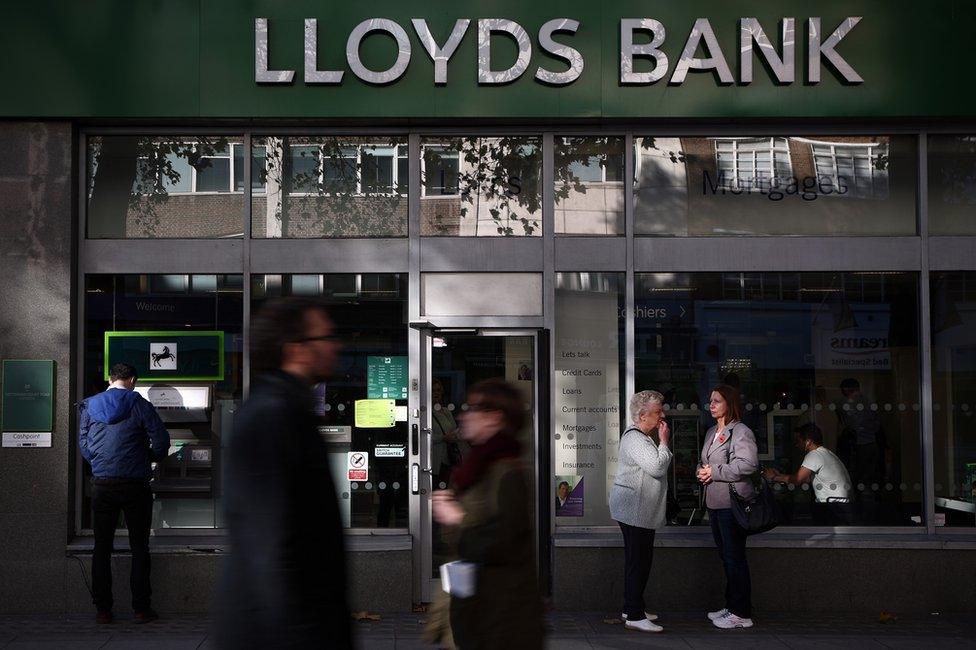Why consumers get a raw deal from internet banking
- Published

Around the world, and across different industries, the internet has cut the cost of doing business.
On everything from music to microwaves, and taxis to train tickets.
Consumers save money by doing their transactions on a computer or mobile phone.
But not when it comes to banking.
Customers of UK banks who use the internet pay just as much for overdrafts and fees as everyone else.
These low-maintenance customers rarely need to call their bank, let alone visit the local branch. From the bank's point of view, they are cheap to look after.
Yet they get no price reductions.
On the face of it, digital customers are getting a raw deal.
Costs
Lloyds - the UK's biggest retail banking group - boasts that is has 10 million customers who access its services via the internet.
In effect, those 10 million are paying for the other 12 million customers who still want a premium and personalised service; namely the ability to go in to a centrally-heated, business-rate paying, well-decorated and well-staffed High Street branch, to speak to a human being.
"If I'm just using online, and never go into a branch, or never ring a call-centre, I would expect to get a better price, because otherwise I am subsidising those people who go into a branch," says Kevin Mountford, head of banking at MoneySupermarket.

No bank will say how much its branch network really costs them. But Lloyds has no fewer than 1,300 such branches in England and Wales alone. And Royal Bank of Scotland (RBS) spent £400m last year on refurbishments.
Either way, transactions on the internet cost banks a tiny fraction of those in-branch, or compared to the cost of processing a cheque.
"As a customer, if I am seeing that my behaviour brings down the operational cost, what's in it for me?" says Mr Mountford.
"I would expect something back. But unfortunately it doesn't happen."
'Astonishing'
None of the big High Street banks offer their customers separate internet banking directly. However HSBC and The Co-operative Bank do so under separate brands.
One of them is Smile, the first full internet bank to be set up, in 1999, and owned by the Co-op.
Smile customers borrowing £500 for a month benefit significantly. The cost is just £7.34, as opposed to £17.40 with the Co-op.
The other is First Direct, which - as a telephone and internet bank only - has much lower running costs than its parent brand, HSBC.
Yet First Direct charges £83.05 to fund a £500 overdraft for a month, only marginally cheaper than HSBC's £87.52.
Mark Mullen, the former chief executive of First Direct - and now boss of Atom Bank - is not impressed.
"I think it is astonishing that you can have banks with very different cost bases, very different sizes of banks, and very different histories of technology, yet somehow miraculously they price just about the same."
Others might wonder why, if Smile charges £7.34 for an overdraft, and HSBC charges £87.52 for exactly the same thing, more customers aren't switching; or why the self-evident benefits of internet banking aren't available more widely.
The banks concerned argue that customers are unlikely to be charged the amounts listed above, as they would be advised to take out a personal loan instead of the more expensive overdraft option.

Social responsibility
In any case, the mainstream banks believe consumers should not be getting lower prices for banking online.
They are acutely aware that differential pricing would make life more expensive for older and vulnerable customers, who rely on a branch network, and often still use cheques.
James Daley, the managing director of Fairer Finance, and a former campaigner with Which? believes that banks have a social responsibility to provide an equal service for everybody.
"You start telling pensioners that they're going to have to pay twice as much for their banking services because they aren't comfortable with the internet - I don't think that would be the right solution.
"I wouldn't want to advocate a world where people who bank predominantly online end up with significantly better deals than those customers who have to use branches."
'Lump it'
So are online customers going to have to continue tolerating paying over the odds for banking?
The answer to that could depend on the launch of Atom, the UK's first truly internet-only bank, sometime before Easter.
Built from scratch, with just 150 staff at its Durham headquarters, Atom will only offer access via the internet or an app. No branches, no call centres.
As a result of its low cost base, it is promising cheaper prices.
The rise of the banking app?
"We would expect to be more competitive when it comes to some - not all - of our charges, and some of our costs," says Mark Mullen.
For example, customers will not be forced to pay both an interest charge and a fee for an overdraft.
And there will be no distinction between an authorised and an unauthorised overdraft. "That's just nonsense", says Mr Mullen.
But even if Atom does offer its users a significantly better deal, the rest of the industry may not feel obliged to follow suit. In this market, competition does not work as it should.
So without a significant shift in banks' attitudes, digital customers may continue to argue they're not getting a good deal.
But they may just have to lump it.
Monday: Do other countries offer consumers better banking than the UK?